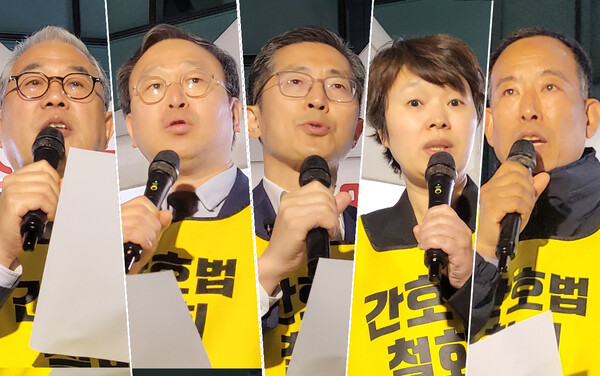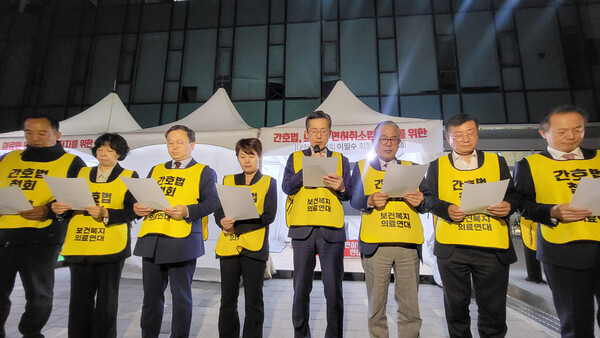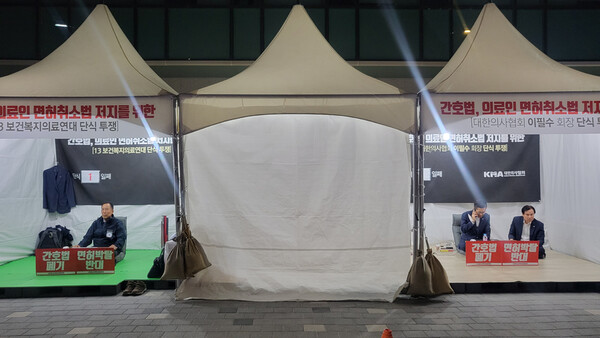
Thirteen medical workers' organizations had expected the National Assembly to approve the two bills, one for the Nursing Act and the other for the Medical Personnel License Cancellation Act.
However, they appeared miserable and frustrated as they watched the process being handled hurriedly at the Assembly’s plenary session Thursday.
“We feel devastated,” said Lee Pil-soo, president of the Korean Medical Association (KMA), the doctors’ group, who went into an indefinite hunger strike right after the legislation. “I feel too wronged, miserable, and angry that such an absurd and unreasonable law passed the parliament in such a unilateral manner.”
The solidarity of the 13 organizations also decided to enter into a strike.
It wants President Yoon Suk Yeol to veto the laws. The organizations will start with partial walkouts in the morning or afternoon from next week before staging a general strike. The solidary said it would “decide an appropriate timing for the nationwide walkout quickly and announce it.”
The representatives of the 13 organizations held a joint meeting at the KMA office in Yongsan-gu, Seoul. Two more heads of these organizations – Kang Yong-su of the Korean Association of Medical Technicians and Kwak Ji-yeon of the Korean Licensed Practical Nurses Association – have joined KMA President Lee’s hunger strike.

The Health and Welfare Medical Solidarity decided to continue its struggle through the parliamentary elections next April. The organizations had warned that they would state a rejection campaign against the opposition Democratic Party of Korea (DPK) which took the lead in enacting the two laws. In addition, the solidarity will launch a general election planning team to turn their warning into concrete actions.
“All medical professionals have done their best to protect the public health and lives. However, it is too much to expand reasons for disqualifying medical workers to an excessive extent as soon as Covid-19 is over,” Lee said. “It is natural for doctors to receive punishment for committing mistakes or wrongs in medical fields. It is also reasonable to cancel the licenses of physicians who commit antisocial and unethical crimes or sexual violence. However, it is too much to revoke the licenses of doctors sentenced to imprisonment for traffic accidents or minor assaults.”
Noting that the KMA has delivered its positions to DKP and the governing People Power Party (PPP) many times, Lee said it was regrettable the parties did not reflect such opinions and pass the bill. “I am sorry to our members,” he said.
Lee then vowed to turn their miserable feelings into an intense struggle.
“If we enter into a general strike, it would cause too much inconvenience and confusion for the people. So, we will start by partial walkout in the morning or afternoon,” he said. “We will also strengthen solidarity with other medical workers’ unions to block the implementation of the Nursing Act and the Medical Personnel License Cancellation Act. All organizations belonging to this solidarity are full of will to fight.”
Kwak, head of the nursing assistants’ union, expressed her wish that the KMA’s emergency response committee would maximize doctors’ fighting will. “We have conveyed the solidarity’s position to KMA’s emergency committee. However, after watching the committee’s meeting, we may rethink our decision to go together with KMA if their conclusion proves unsatisfactory.
Kang, who heads the emergency medical technicians, said, “Listening to DKP lawmakers’ remarks at the Assembly, I thought their understanding of minority vocational groups was too low. Although we explained our positions repeatedly, legislators viewed this as only the fight of doctors vs. nurses,” Kang said. “All medical workers should be one team that protects the public in emergencies, but things turned out differently. We feel regrettable but will be with the solidarity until the end.”
Korean Dental Association President Park Tae-keun said, “We will hold a regular meeting of delegates on Saturday. I will seek the delegates’ full support for the solidarity strike to join it. We are facing a very difficult situation. Therefore, we will strengthen exchanges with solidarity and add our force to produce good results.”
Park Myong-ha, head of the KMA’s emergency response committee, said, “We will decide concrete strike timing and methods through discussion with the solidarity. Then, we will work out detailed partial walkout plans to suit the situation facing different organizations and announce them early next week.”
Park acknowledged criticisms about the general strike, but the decision was inevitable, seeking the public’s understanding.
Chang In-ho, head of the Korean Association of Medical Technologists, said, “We could not decide on the strike easily for the sake of people’s lives and safety. That’s why the meeting got longer. We will focus on how to stage effective and strong struggle in deciding the date for a general strike by discussing with the KMA’s emergency response committee.”
Han Jeong-hwan, president of the Korean Radiological Technologists’ Association, said, “It’s regrettable and heartbreaking to reach this situation. However, we decided to stage a strike not to take the people hostage but to help the people know what’s happening correctly.”

Related articles
- 83% think it ‘necessary to legislate optimal number of patients per nurse’
- Reopening the nursing act debate requires a 'scientific basis'
- Concerns mount over paralyzing emergency care amid healthcare workers' strike
- No ‘medical crisis’ seen on strike’s 1st day, but ERs face ‘the calm before the storm’

